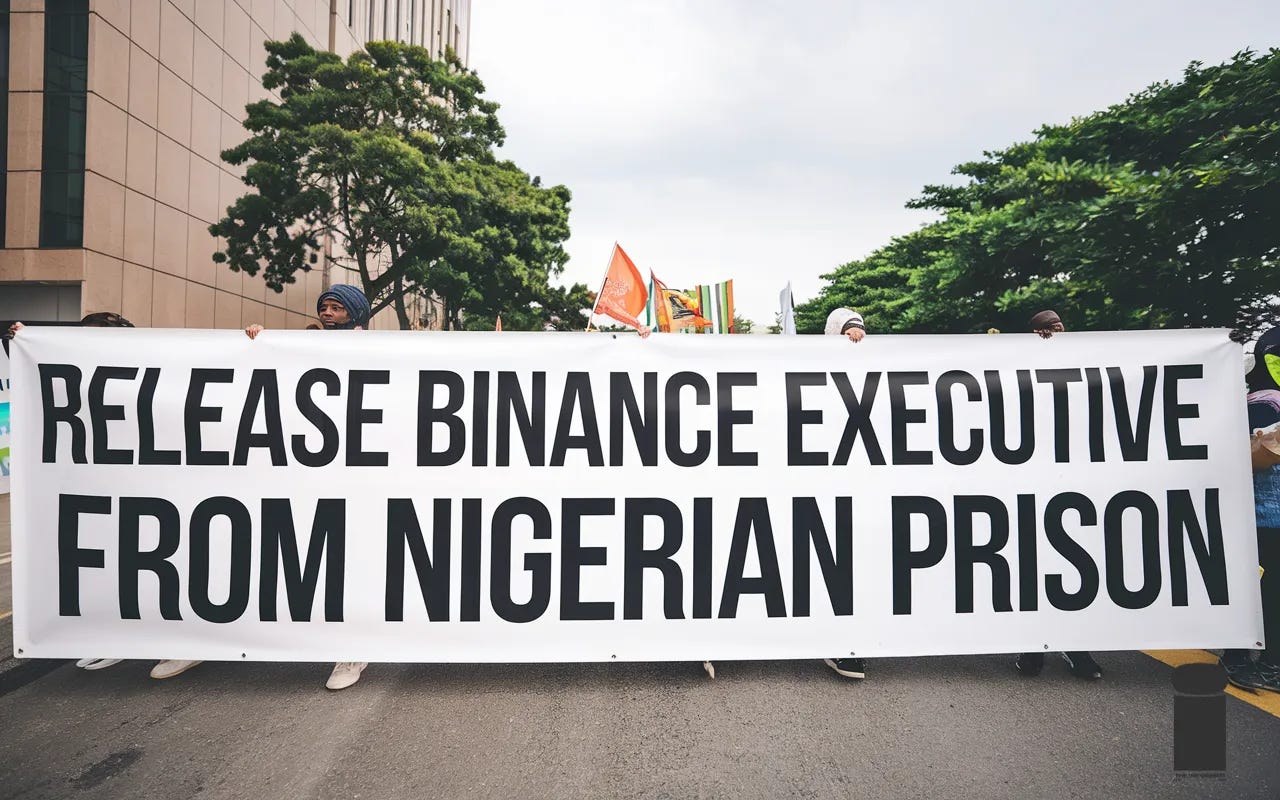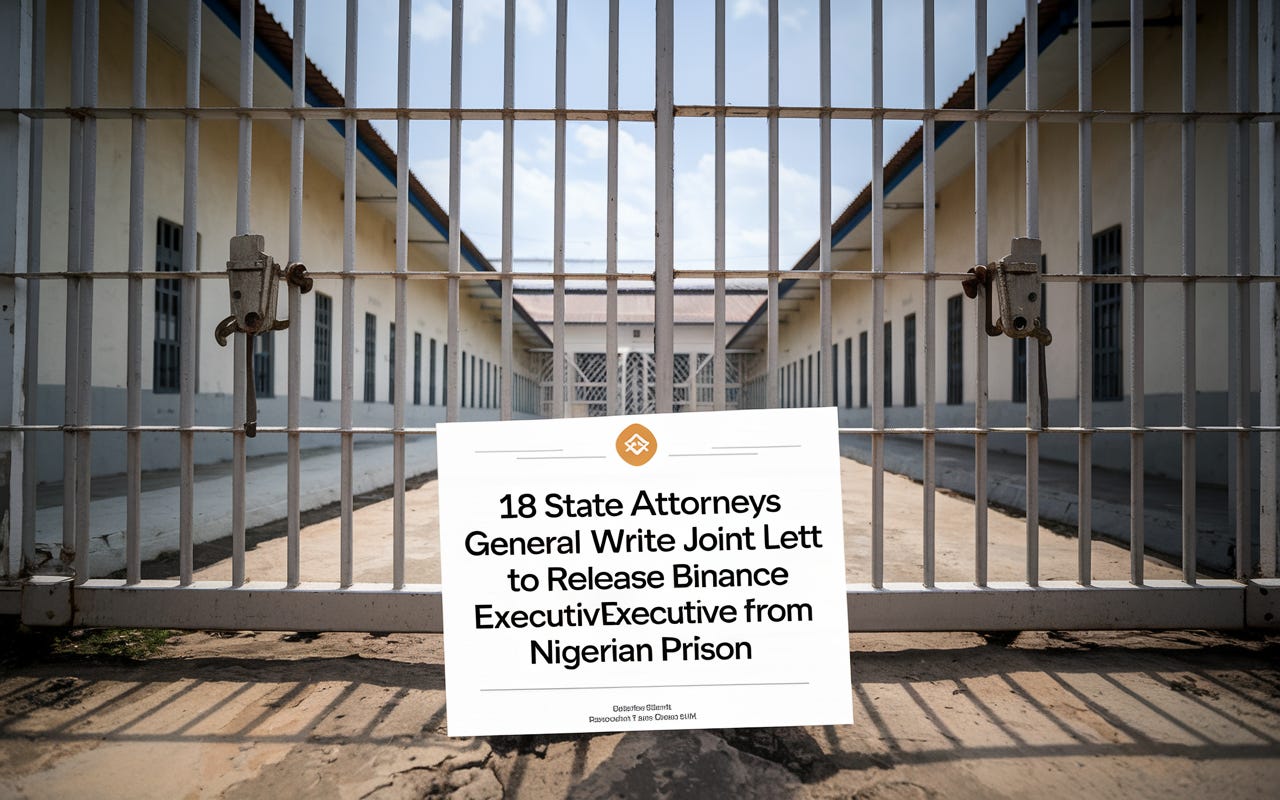18 U.S Attorneys General have written a joint letter requesting the release of a Binance executive from prison in Nigeria.
A Diplomatic Chess Game: U.S. Attorneys General Call for Action in Binance Exec’s Nigerian Ordeal
In the world of cryptocurrency, drama isn’t exactly rare, but Tigran Gambaryan’s story takes the chaos up a notch. Gambaryan, Binance’s top compliance officer and former IRS agent, is the guy who helped dent some of the internet’s darkest corners and is currently languishing in a Nigerian prison. And the situation has gotten so bad that a bipartisan group of 18 U.S. state attorneys general are now pulling political strings to get him out.
It sounds like the plot of a Netflix political thriller: a U.S. citizen, an ex-law enforcement hero who took down global cybercriminals, locked up in a foreign jail, allegedly without basic medical care. Gambaryan was arrested back in February while visiting Nigeria to discuss—you guessed it—regulatory issues tied to Binance’s operations. Now, he’s facing charges of money laundering and running an unlicensed financial institution. Yes, it’s as messy as it sounds.
The Bigger Issue: Diplomatic Games and Financial Leverage
In August, whispers started spreading about Gambaryan’s rapidly declining health. There is no proper medical care, no decent treatment, and likely no Netflix, either. The Nigerian government seems unbothered by international eyebrow-raising. But here’s where things take a darker twist: the U.S. attorneys general aren’t just pointing to regulatory missteps. They’re arguing that this is far from a straightforward arrest—it’s political extortion.
Their joint letter to President Joe Biden and Secretary of State Antony Blinken doesn’t mince words. They want Gambaryan to be officially designated as a hostage under the Robert Levinson Hostage Recovery and Hostage-Taking Accountability Act. The Act—named after a former FBI agent who disappeared in Iran—would give Gambaryan’s case an urgent status, unlocking serious diplomatic resources and political leverage. In short, the gloves would come off.
And let’s be clear: this isn’t just about Gambaryan. The letter emphasizes that this case is about setting a precedent. If a former IRS agent who has played a crucial role in taking down major criminal operations like AlphaBay, Silk Road, and even child exploitation rings can be thrown into a cell under flimsy charges, who’s safe? The attorneys general argue this case is a diplomatic crisis in the making, and America’s response will set the tone for how future cases are handled.
Why Nigeria, and Why Now?
Nigeria, with its thriving tech scene and massive population, is both a key market and a regulatory minefield for crypto giants like Binance. Gambaryan’s visit was aimed at smoothing things over with Nigerian authorities, who have cracked down hard on crypto in recent years. Yet, instead of mending fences, it seems things got lost in translation—or maybe that was never the plan in the first place.
Let’s not pretend this is just about a single executive. The U.S. has significant political and financial ties with Nigeria, and the country plays a strategic role in Africa’s broader economic development. But with Gambaryan’s case looking more like an opportunity for leverage, it raises the question: is Nigeria playing a high-stakes game to secure better terms or a diplomatic favor? And more importantly, how will the U.S. respond?
Is This a Case of Crypto Karma or Diplomatic Dysfunction?
If you’ve followed the trajectory of Binance, you’d know that the company has had its fair share of regulatory run-ins worldwide. From fines to outright bans, it’s not exactly the golden child of crypto compliance. But even for a company like Binance, this situation smells more like a setup than a slip-up. The Nigerian authorities are holding some pretty wild cards here. They’ve got a U.S. citizen with high-level law enforcement credentials sitting in their prison, and they're not exactly hurrying to explain why.
The attorneys general aren’t holding back either. They’ve called the Nigerian government's actions “blatant extortion” and are pushing the Biden administration to bring out the big guns. “The full weight of the U.S. Government’s influence” might sound like something out of a State of the Union address, but when it comes to political chess, those are fighting words.
What Happens Next?
Well, if Gambaryan gets the official designation as a hostage, the U.S. government will have a lot more tools to use in negotiations. There’ll be more pressure on the Nigerian regime, and the situation could turn into a full-on diplomatic standoff. That’s a polite way of saying things could get uglier before they get better. But this isn’t just about one man or one company. It’s about how the U.S. handles its own citizens being used as bargaining chips in international power plays.
If the Nigerian government continues to refuse medical care and basic rights to Gambaryan, it’s not just a matter of regulatory crackdown gone too far—it’s a human rights issue. And for the U.S., a country with a global reputation (flawed as it may be) for standing up for its citizens abroad, there’s a lot at stake here.
What’s the Play for Crypto Enthusiasts?
Now, for all you crypto followers out there, this isn’t just a reminder that governments are still trying to figure out how to handle digital currency—it’s a wake-up call. Crypto might operate outside the bounds of traditional finance, but the rules of geopolitics still apply. If anything, they’ve gotten more complicated. In a world where countries are still sceptical of cryptocurrencies, those involved in the industry are walking a tightrope.
This case is a stark reminder that the crypto world isn’t the wild west it once was. Regulation is coming, whether people like it or not, and the stakes have never been higher. If Gambaryan’s ordeal tells us anything, it’s that when crypto meets politics, things can get very, very messy.
Is the Future of Crypto Diplomacy at Risk?
We’re all waiting to see how the U.S. government handles this. Will it be a show of force, with the Biden administration applying diplomatic muscle, or will this be another long, drawn-out saga where everyone forgets Gambaryan’s name by next week? Either way, it’s a pivotal moment—not just for one man, but for the future of how the world treats those at the intersection of cryptocurrency and international relations.
Don’t Miss a Beat – Stay Updated
If you're tracking this crypto-drama or want to be the first to hear how this international tug-of-war plays out, don’t just sit on the sidelines. Subscribe to get the latest updates delivered right to your inbox.




